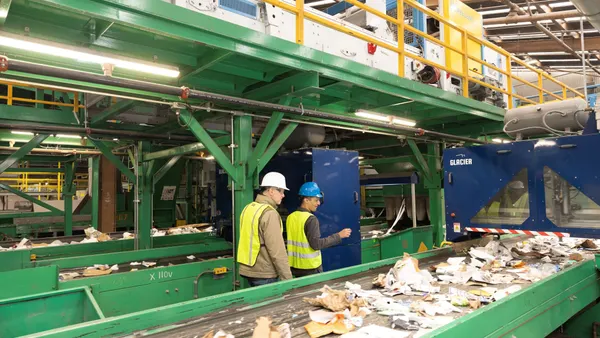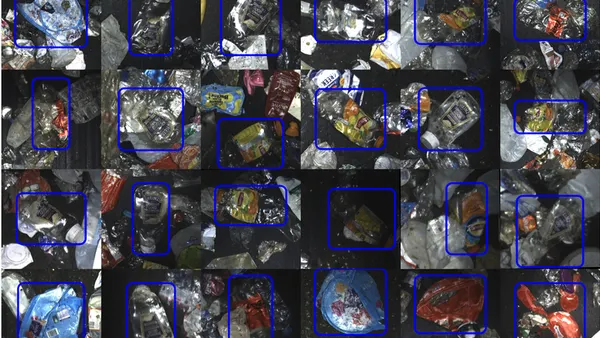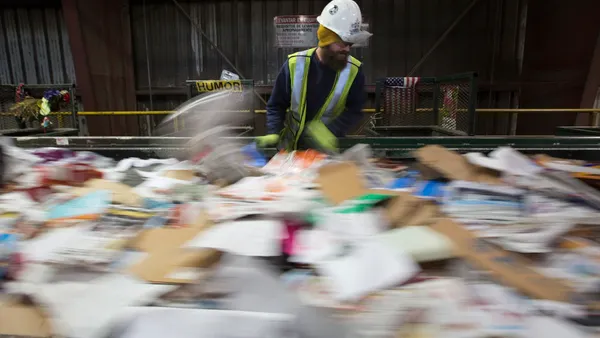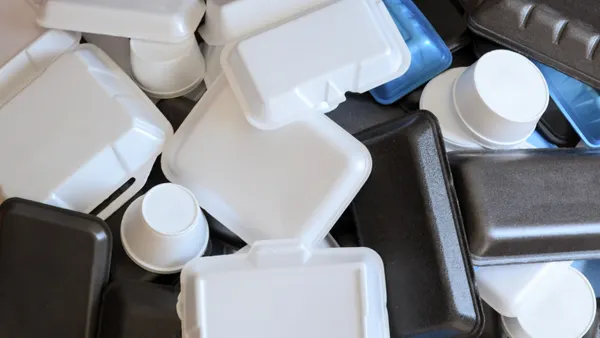Welcome to Scrap Collector, Waste Dive's Friday round-up of insights and stories you may have missed during the week.
Southeast Asian environmental groups aren't happy with the Association of Southeast Asian Nations (ASEAN). This year's summit in Bangkok will see leaders from the 10 member countries — including Thailand, Malaysia, Indonesia, Vietnam and the Philippines — gather to discuss global sustainability issues.
Notably absent from the docket, however, is any mention of the international scrap trade.
"We are quite surprised and a little bit disappointed because ... the issue of waste trade that the region [is] facing has not been [put] on the table," Greenpeace Thailand country director Tara Buakamsri said at a press conference on Tuesday, according to Voice of America.
ASEAN's expected adoption of the Bangkok Declaration on Combating Marine Debris — its first ocean pollution agreement — is "not enough," according to Buakamsri. In the wake of China's scrap ban, Southeast Asian countries have attempted to stymie a tide of contaminated imports, with Malaysia, Indonesia and the Philippines announcing plans to ship back thousands of tons of material.
In light of increasingly dire circumstances, activists are calling for ASEAN to ban all plastic and e-waste imports — including those labeled as recyclables — and to sign the recently ratified Basel Convention plastics amendment.
Some industry stakeholders, however, caution against sweeping bans.
"A blanket ban is not a perfect solution, ignoring the nuanced contexts and not solving the fundamental problem," Chris Cui, director of Closed Loop Partners' China Program, told Waste Dive via email. "We would encourage policy makers to work with private industry, local NGOs and communities to come up with a more holistic approach that integrates circular economy principles from the start, ensuring that either imported or domestic waste is safely transformed into valuable commodities."
Arnaud Brunet, director general of the Bureau of International Recycling, emphasized to Waste Dive the distinction between scrap and illegal waste.
"We can only regret and condemn the illegal trade of waste and their consequences on the environment, but those are criminal activities unrelated to the legal activities of the recycling companies involved in international trade of scrap," he commented via email. "We do not believe that a ban on trade of secondary raw materials is a long term option, when secondary raw materials are needed for production around the globe and as a substitute to primary resources. The solution is for the industry to process more and produce better quality scrap, and for the manufacturers to design for recycling and incorporate more recycled content."
IN OTHER NEWS...
Hawaii County Council approves bill allowing single-use plastic alternatives to polystyrene - West Hawaii Today
A Hawaii County ban on polystyrene food containers takes effect on July 1 — and the county council has taken a contentious step in preparation for the new law.
Council members unanimously approved on Wednesday a measure (Bill 74) that would loosen restrictions around plastic alternatives to polystyrene. Acceptable substitutions, per the bill, would include plastics the county doesn't recycle — No. 5 plastic "clamshell" containers, for instance.
"We have a bigger problem of our waste-stream management. This doesn't attend to that but it doesn't ignore it either," said bill sponsor Tim Richards. "Our intention is to come back and do something on a grander scale in planning for the future. We have to do something different. This is to correct something in the meantime while we attend to that."
The bill, which faces one more reading, is supported by the Hawaii Food Industry Association, the Hawaii Restaurant Association and local retailers struggling to find recyclable alternatives to polystyrene.
Environmental groups, however, have objected to simply swapping out polystyrene for other single-use plastics.
"If we truly wish to help reduce the solid-waste and plastic pollution (aka marine debris!) problem on island, we won't jump from one toxic single-use plastic (foam) container to another (non-foam) plastic container," Megan Lamson, president of Hawaii Wildlife Fund, wrote in testimony.
AROUND THE WORLD
UK government slammed for rejecting textile waste recommendations — The New York Times
French Prime Minister Édouard Philippe announced a ban earlier this month on the destruction of unsold consumer goods, condemning the practice as "waste that shocks, that is shocking to common sense."
This was presumably the sort of response the UK's Environmental Audit Committee intended to provoke with a recent report on fast fashion's environmental costs. Hopes were dashed earlier this week, however, when the government rejected all 18 policy recommendations outlined in the report.
The decision has been widely condemned by committee members, environmentalists and a number of high-profile fashion designers.
"Fashion producers should be forced to clear up the mountains of waste they create," said committee chairwoman Mary Creagh. "The government has rejected our call, demonstrating that it is content to tolerate practices that trash the environment and exploit workers, despite having just committed to net-zero emission targets."
According to the report, UK consumers purchase more new clothes annually than any other European country, incinerating or landfilling approximately 300,000 metric tons of textile waste each year. Recommendations include introducing a more robust extended producer responsibility scheme for the textile industry (including a one penny per garment charge on producers) and a ban on landfilling or incinerating unsold stock.
SEEN & HEARD
Yesterday was a grim one for waste worker safety. 2 dead, 1 severely injured across three states. May be more haven’t seen yet. No clear link, just a reminder that these workers deserve more of our attention. 1/4
— Cole Rosengren (@ColeRosengren) June 14, 2019
If all we're doing is recycling, without looking at materials' impacts on human and ecological health, then we may be #retoxing. Emphasizing a #CradletoCradle circular economy so it is safe first, then circular, is one way we can help achieve a healthier future. #Circularity19
— William McDonough (@billmcdonough) June 17, 2019
It's always important to know your partner's love language, even if they are piles of metal and machinery who eat garbage all day. pic.twitter.com/ntMZYLDA5E
— Mr. Trash Wheel (@MrTrashWheel) June 20, 2019










